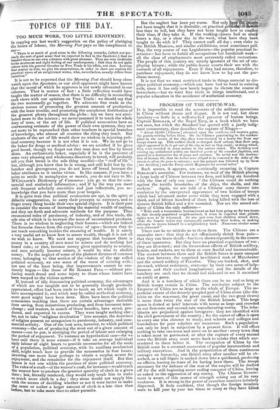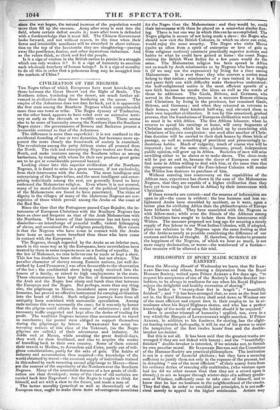PROGRESS OF THE OPIUM-WAR.
IT is impossible to read the accounts of the military operations in China without shame and disgust. It is not war, but sheer butchery—a battu in a well-stocked preserve of human beings. Captain BINGHAM, of the Royal Navy, in a book which we have not seen, but which the Standard has quoted with a justly indig- nant commentary, thus describes the capture of Ningpo- ., About 12,000 1Chinesej advanced upon the southern and western gates, the guards retiring before them. On the Chinese penetrating to the market- place in the centre of the city, they were received by a heavy fire from our troops drawn up. This sudden check so damped their ardour, that their on/k object appeared to be to get out of the city as fast as they could; in doing which, they were crowded in dense masses in the narrow street. The Artillery now coming up, unlimbered within one hundred yards of the crowded fugitives, and poured in a destructive fire of grape and canister. So awful was the destruc- tion of human life, that the bodies were obliged to be removed to the sides of the streets to allow the guns to advance; and the pursuit was followed up by them [the Artillery] and the Forty-ninth Regiment for several miles."
Such scenes, it appears, are continually recurring in Captain
BINGHAM'S narrative. For instance, we read of the British placing a large body of Chinese between two fires, and killing six hundred with the loss of only one man : "the Chinese could do nothing against the terrific broadsides of the ships, the shells, and the rockets." Again, we are told of a Chinese army thrown into confusion by the unexpected appearance of two bodies of troops which had advanced under cover while they were engaged with a third, and of' fifteen hundred of them being killed with the loss of sixteen British killed and a few wounded. Nor are the armed sol- diery of China the only sufferers- " With such a tremendous bombardment as bad been going on for two hours in this densely-populated neighbourhood, it must be expected that pitiable sights were to be witnessed. At one spot were four children struck down, while the frantic father was occasionally embracing their bodies, or making attempts to drown himself in a neighbouring tank. Numerous similar man
were witneased-" •
There can be no mistake as to these facts. The Chinese are a
muscular race : that they do not effeminately shrink from pain— that they can brave death—has been shown repeatedly in the course of these massacres. But they have no practical experience of war ; they are ill-armed ; and the tremendous effects of British artillery, bombs, and rockets, are to them at cnce fearful and inconceivable. The contest between them and the British forces is more unequal than that between the surprised bewildered mob of Manchester' and the armed soldiery of Peterloo. They are hacked, shot, and drowned, without resistance, overcome by their own sense of help- lessness and their excited imaginations; and the details of the butchery are such that we should feel sickened to see it exercised on cattle or game. And it is a butchery of which there can be no end so long as
British troops remain in China. The territories subject to the Emperor of China are as large as the whole of Europe. The su- perficial extent of the densely-peopled part of China alone (the dis- tricts on the sea-coast, the great canal, and the two great rivers) is more than twice the size of the British Islands. This large space is dotted at brief intervals with towns as large and crowded as our first-rate and second-rate manufacturing-towns. The inha- bitants are prejudiced against foreigners : they are identified with the civil government of the country ; for the career of office is open to every one who chooses to study, and schools and colleges and foundations for poor scholars are numerous. Such a population can only be kept in subjection by a present force. It will effect nothing to take one town and move on to another : every town that is taken must be garrisoned, or after the capture of every second town the British army must move back to retake that which sur- rendered to them before it. The occupation of China by the British must be a constant succession of popular insurrections and military executions. And in the perpetration of these continuous outrages on humanity, one British army after another will be ab- sorbed, as a tall frigate is sucked down into a quicksand, producing no effects, leaving no trace of its having been there. The troops necessary for the defence of the rest of the empire will be drafted off for the still beginning never ending conquest of China, leaving us naked to the aggression of any enemy. The Chinese Govern- ment is aware of this source of strength arising out of its very weakness. It is strong in the power of countless numbers infinitely dispersed. It feels confident, that though the foreign invaders were to kill year by year ten times as many as they have killed
since the war began, the natural increase of the population would more than fill up the vacuum. Army after army is sent into the field, where certain defeat awaits it ; town after town is defended with a foreknowledge that it must fall. The Chinese Government looks forward, and not without reason, to the time when their fierce and irresistible assailants will be stretched in sheer exhaus- tion on the top of the hecatombs they are slaughtering—passing away like pestilence, famine, and other mysterious visitations. And as the rulers think, so think and feel the people.
Is it a sign of wisdom in the British nation to persist in a struggle which can only weaken it ? Is it a sign of humanity to sanction such wholesale butchery of human beings ? Is it a sign of morality to do all this in order that a poisonous drug may be smuggled into the markets of China ?



























 Previous page
Previous page